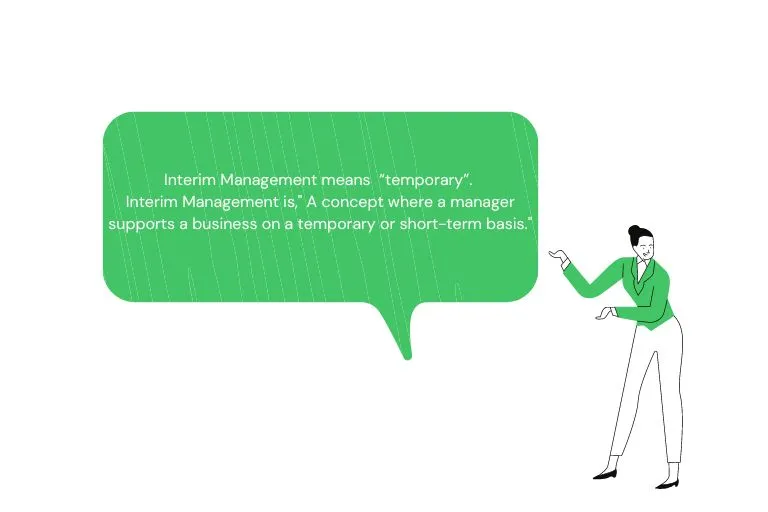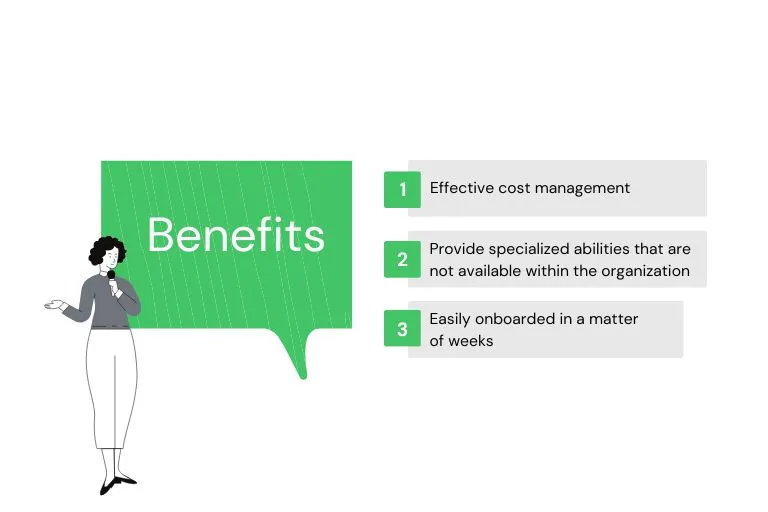Interim Management literally means “for the time being” or “temporary”.. Interim management is defined as “a concept in which a manager provides temporary or short-term assistance to a business.” What can you do when an unforeseen event affects your company? As you try to pick up the pieces, you’re likely to wonder about bringing in an accomplished CEO with considerable experience in the same type of crisis your company is facing, just long enough to get you through it. That, however, is not a daydream. There is such a choice. One of the most recent types of troubleshooting management strategies to emerge in recent years is called interim management. Even if it is comparable to hiring a management consultant, there are a number of compelling advantages that can help your firm recover far more quickly and effectively than a management consultant can. 
What is Interim Management?
The temporary provision of senior-level expertise and abilities by an outside professional, typically for a particular project, job, or aim, is known as interim management. They are not workers, consultants, or freelancers, but rather high-caliber professionals capable of stepping in and delivering outcomes swiftly and effectively. Consider a family-run business that has lost its competitive edge in the market during the last five years owing to internal family politics. To make matters worse, the Managing Director has abruptly quit, and the Chairman understands that the company’s current management team is inexperienced. The Chairman has two options. He can hire a senior executive from another company on a permanent basis. However, this depletes precious resources and may further destabilize the organization as family members feel threatened and depart. Worse, if the new executive is the wrong pick, it will be tough to remove her. The other alternative is an interim manager with a specialization in the needed field and experience in short-term troubleshooting and company efficiency. The choice is obvious. By appointing an interim manager, the corporation can have someone in place more quickly and avoid escalating the internal politics that are currently paralysing it. The Chairman can make a quick decision from a panel of highly qualified executives assembled by the interim management agency, saving time and money on the legwork. Because of the temporary manager’s brief tenure with the organization, existing employees will feel less endangered. So why bother hiring at all? Wouldn’t hiring a management consultant provide both of those advantages?? Isn’t “interim manager” merely a fancy way of saying “management consultant”? Not at all! An interim manager is essentially a management consultant, but a management consultant is not an interim manager.
How might interim management assist you in filling talent gaps?
Depending on your objectives and goals, interim management can give your firm with a variety of benefits. Without the requirement for recruitment, training, or retention, this style of management can provide you with access to a pool of diverse and competent individuals with established records and industry knowledge. It can also fill a temporary void, such as maternity leave or resignation, to guarantee continuity and stability. Interim management can also assist in the administration of a specific project or transition, such as a restructuring or digital transformation, by bringing in new perspectives, insights, and best practices. Finally, by introducing new skills, processes, and tools while mentoring existing workers, it can improve performance, efficiency, and innovation.
Who is an Interim Manager?
Interim Managers are normally senior executives capable of driving transformation projects, crisis management, turnaround, corporate restructuring, or unexpected critical exits. They identify the problem, propose a solution, oversee implementation while training internal personnel, and then move on. They have extensive previous experience as Chief Finance Officers (CFOs), CIOs, and Leadership Executives. Interim managers have a track record of successfully reforming firms at various stages of their life cycles. They are knowledge workers – change drivers with extensive managerial skills to meet a short-term, project, or changeover requirement. Consider a manufacturing company that has to adopt an automated digital solution within its manufacturing chain. An Interim Manager would be the appropriate answer for project management. Their position would be critical in passing information to internal teams and exiting within a certain time frame. Interim Executive talents are rendered obsolete after a project is completed. As a result, keeping them on a long-term basis is unnecessary.  Why hire an Interim Manager? In general, there are several reasons for appointing an Interim Manager:
Why hire an Interim Manager? In general, there are several reasons for appointing an Interim Manager:
- Interim managers bring knowledge to an active management team, filling a need left by transitional periods. Interim managers with extensive experience can successfully turn around struggling organizations or businesses.
- Furthermore, they provide strict financial management assistance and proper direction. This is crucial for a company that has lost its focus and capacity to manage critical business tasks.
- Interim managers are great for new business start-ups, new business improvements, acquisitions and mergers, and entire company restructuring. One of their assets is their capacity to organize change in a flexible manner under times of stress.
- These specialists guide you through the process of hiring a permanent executive or extending the present executive’s leave of absence.
Benefits of Interim Management

Executives are generously compensated. This includes the additional financial burden, bonuses, health coverage, holiday pay, pension, house, children’s education, and company car benefits.
- Interim management also provides for better cost control.
- Interim Managers have highly specific skills and knowledge. They provide specialized abilities that are not generally available within the organization. Depending on the role, they frequently have comparable higher credentials. These achievements are frequently greater than those for which they are replacing or holding the fort.
- Interim managers are objective, impartial, and results-oriented. They are not burdened by pre-existing organizational relationships, office politics, or career promotion aspirations.
- Interim managers give outcomes on schedule because they are aware of the business objectives and deliverables that are expected of them. They make certain that they build a good market reputation in order to secure their next interim assignment.
- Interim management is typically a quick and efficient way to bring on highly trained people in the shortest amount of time.
- Interim Managers can be easily onboarded in a matter of weeks. In contrast, significant periods of 3-6 months are spent looking for permanent candidates. Interim managers give the necessary competencies to keep the firm running in a critical circumstance where there is a sense of urgency.
- Interim Managers provide relief for firms that have a staffing constraint yet require vital knowledge infusion.
What are the risks and challenges of interim management?
Interim management can be a dangerous proposition for both you and the interim manager. It can be tough to find the ideal interim manager for your project, especially in a competitive and dynamic industry. To find competent people, you may need to act quickly and rely on trusted sources. Integrating the interim manager into your team may also be difficult because you will need to manage expectations and address any cultural or interpersonal difficulties that may occur. Hiring and firing an interim management can also be expensive and disruptive, especially if the project is complex or unpredictable. You must invest in contract negotiation and administration, as well as guaranteeing compliance and quality standards and easing the exit and transition process. 
What does this mean for companies worldwide?
Interim management is a developing force in the management business, with all signs pointing upward. Indeed, recent trends indicate that interim managers will take on much of the function of present management consultants as businesses become more specialized and seek faster solutions. This provides individuals with an amazing opportunity to get in “on the ground floor” of this rapidly expanding sector.